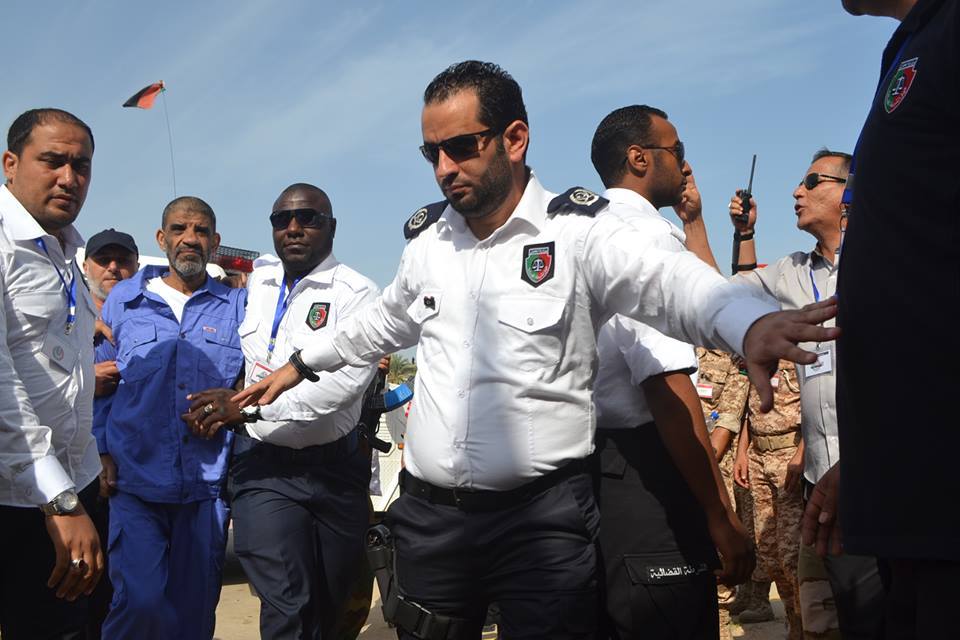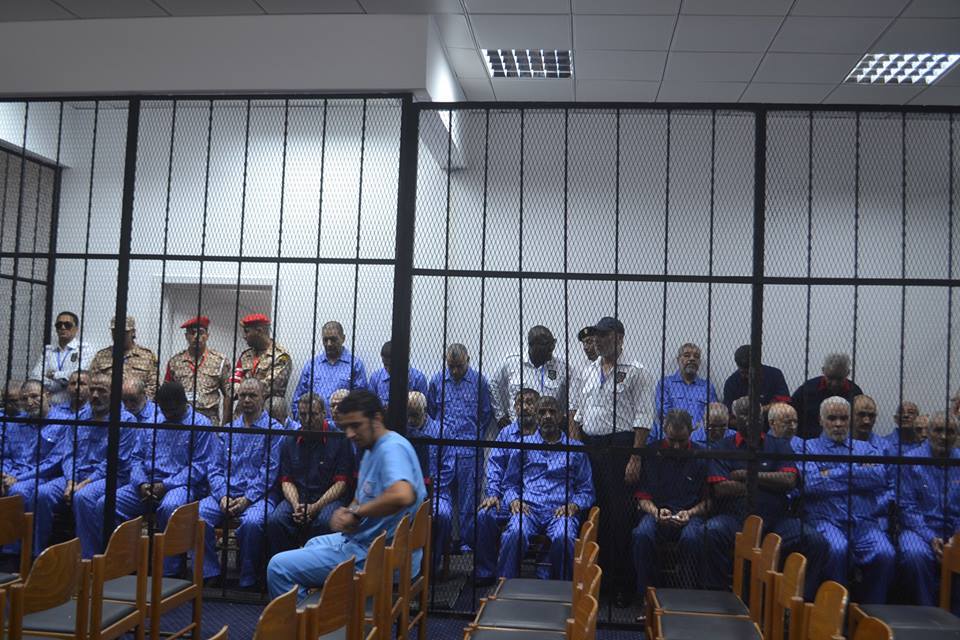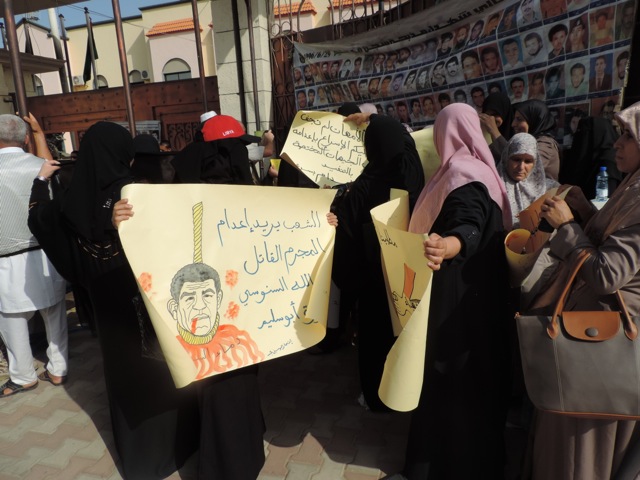By Ashraf Abdul-Wahab and Ahmed Elumami.

Tripoli, 19 September 2013:
Abdullah Senussi, Qaddafi’s intelligence chief and brother-in-law, made his first appearance in court in Tripoli . . .[restrict]today to face charges of murder, conspiracy to murder and human rights crimes during the revolution, along with 36 other former regime defendants.
Saif Al-Islam Qaddafi, however, did not join Senussi in the court despite an announcement yesterday from the Attorney General that, along with orders to various towns to hand over their former regime prisoners, he had ordered Zintan to send Qaddafi’s son to Tripoli this morning. Earlier reports today that it had done so were mistaken.
Instead Saif Al-Islam made a separate court appearance this morning in Zintan on the lesser charges of trying to escape.
The Tripoli hearing was largely concerned with the formalities of establishing charges and identities. Along with Senussi who looked thin and gaunt, appearing to confirm his doctor’s claim that he has prostate cancer, the 36 accused appearing today included Qaddafi’s External Security Agency head Abu Zaid Omar Dorda, former Foreign Minister Abdul Ati El-Obaidi, the General People’s Conference head Mohamed Al-Zway, former Prime Minister Al-Baghdadi Al-Mahmoudi, and Tripoli Internal Security Agency head Mansour Dhou.
Unlike Senussi, Dorda, Obaidi and Zway have already made court appearances in Tripoli. Dorda’s case was adjourned on several occasions while Obeidi and Zway, who were arrested in July 2011, were found not guilty in June on charges of maladministration while in office and wasting public funds.
Proceedings against Mansour Dhou, captured in Sirte by Misratan forces on 20 October 2011, first opened in Misrata two months ago when he was charged, among other things, with employing foreign mercenaries to set up rocket launchers to attack NATO aircraft. He was transferred to Tripoli this morning, in compliance with the Attorney-General’s request.

At the end of two hours today, during which the defendants confirmed their names and the charges against them were read out, the pre-trial hearing was adjourned until 3 October. By then, the judge and his deputy ordered, defence lawyers must have reviewed their clients’ files and prepared their defences.
The proceedings were watched by a handful of foreign press reporters alongside local print and media journalists. Outside the court, there was a small protest by families of Busleem prison massacre victims, many with placards demanding that Senussi and others be hanged. Security was high both inside and outside the courtroom, with local shops being asked to close up.
Before it was adjourned, a member of the Attorney-General’s office, Sadiq Al-Sour, told the Tripoli court that Saif had not been brought from Zintan for “some security reasons”.
He added that the head of Ministry Justice Penal Institutions in Zintan was to be asked about Saif’s absence, given that prisons in Misrata, Benghazi, Sebha and Zawia had complied with the Attorney-General’s instructions and had delivered to the court the suspects they were holding.
Yesterday, the Attorney General’s office said it had issued orders to bring 38 defendants from Qaddafi’s regime including Saif Islam Qaddafi to Tripoli to appear in court today.
The Attorney General himself, Abdulaqader Jumaa Radwani, said that there were 4,000 pages of accusations against the 38 defendants, supported by some 40,000 other documents.

Meanwhile in Zintan, Saif made his third court appearance on charges relating to his alleged attempt to escape and endangering national security. For the first time, he had two lawyers, one appointed by the court, the second appointed by his relatives, although exactly who is unknown.
Speaking in court, he said he wanted the trial to be in Zintan, not in Tripoli.
His lawyers asked for more time to read charges, check the evidence and build up his defence. Accepting the plea, the judge adjourned the case until 12 December.
Before doing so, however, he called for Saif’s ICC Australian lawyer, Melinda Taylor, and her Lebanese translator, Helene Assaf, to show themselves to the court. They, along with two other ICC officials were held for nearly a month last summer after Taylor was accused of passing secret documents to Saif.
It is not clear at this point if the court wants them merely to give evidence or if they are now being formally charged in absentia on the same charges as Saif. Officials in Zintan had already indicted that they planned to charge Taylor and Assaf, although the ICC’s local representative, Dr Fadi El-Abdallah, has pointed out that any such proceedings would be illegal because they had immunity.
Senussi and Saif are both wanted by the International Criminal Court (ICC) in The Hague. In the case of Saif, the Libyan authorities filed a case in May last year at the ICC to prosecute him in Libya. It was told it could postpone handing him over until the ICC made its decision. At the end of May this year, the ICC judges rejected the application and told the Libyan authorities that they were obliged to hand him over.
To coincide with Libyan plans to charge Saif Al-Islam today with murder and other crimes, Human Rights Watch issued its own demand that he be surrendered to the ICC.
“Carrying on with a domestic proceeding against Saif Gaddafi in the face of an ICC order to turn him over to The Hague is a serious misstep,” said Richard Dicker, international justice director at Human Rights Watch. “Libya assured the UN Security Council it would cooperate with the court, and it needs to turn Saif Qaddafi over to The Hague without any more delay.”
The reality, however, is regardless of whether or not it wants to send him to The Hague, the Libyan government is powerless to do so at present, given that Zintan refuses to surrender him.
Senussi does not, as yet, have to be surrendered to the ICC while a Libyan appeal to allow him to be tried in Libya is heard by the judges in The Hague. However, it has said that, whatever the outcome of any trial in Tripoli against him, Libya must hand him over if it rules, as it did with Saif, that he must be sent for trial in The Hague.
With input from Aimen Eljali [/restrict]








